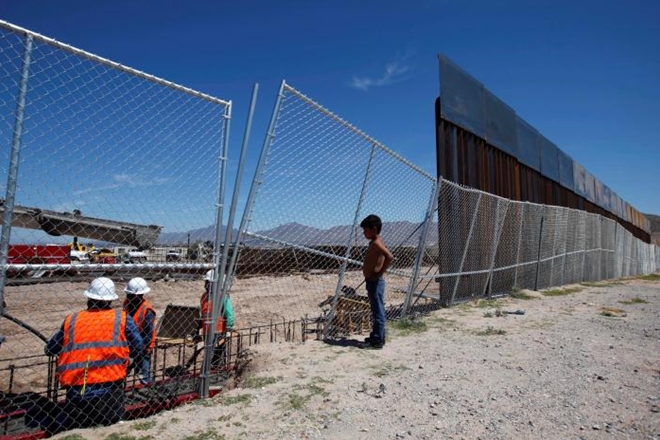U.S.-Mexico crisis deepens as Trump aide floats border tax idea
- Mexico extradites top drug lord 'El Chapo' to U.S.
- Mexico lays out cards for high stakes talks with Trump
- Gang-ravaged Mexico stuck in weed ban as U.S. opens up
- Mexico fireworks market blasts kill at least 29, injure scores
exican President Enrique Pena Nieto announced on Twitter around midday on Thursday that he was scrapping a planned trip to meet with U.S. President Donald Trump, who has repeatedly demanded that Mexico pay for a wall on the U.S. border.
 |
| A boy looks at U.S. workers building a section of the U.S.-Mexico border wall at Sunland Park, U.S. opposite the Mexican border city of Ciudad Juarez, Mexico. REUTERS/Jose Luis Gonzalez |
Later in the day, White House spokesman Sean Spicer sent the Mexican peso falling to its low for the day when he told reporters that Trump wanted a 20 percent tax on Mexican imports to pay for construction of the wall.
Spicer gave few details, but his comments resembled an existing idea, known as a border adjustment tax, that the Republican-led U.S. House of Representatives is considering as part of a broad tax overhaul.
The White House said later its proposal was in the early stages. Asked if Trump favored a border adjustment tax, White House Chief of Staff Reince Priebus said such a tax would be "one way" of paying for the border wall.
"It's a buffet of options," he said.
The plan being weighed by House Republicans would exempt export revenues from taxation but impose a 20 percent tax on imported goods, a significant change from current U.S. policy.
"If you tax exports from Mexico into the United States, you're going to make things ranging from avocados to appliances to flat-screen tvs, you're going to make them more expensive," Mexican Foreign Minister Luis Videgaray told reporters at the Mexican Embassy in Washington on Thursday night.
Countries like Mexico would not pay such taxes directly. Companies would face the tax if they import products made there into the United States, potentially raising prices for American consumers.
The idea is unpopular with retailers and businesses that sell imported goods in the United States. It also has met opposition from some lawmakers worried about the impact on U.S. consumers.
Trump himself appeared to pan the idea in a Wall Street Journal interview last week, saying the House border adjustment provision was "too complicated."
Even after Trump's comments, congressional Republicans have continued to discuss the issue with White House officials in an effort to bring them on board with the idea.

